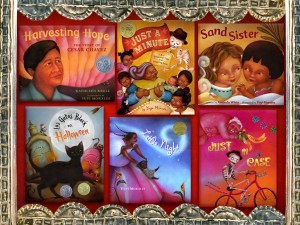by Jeanne Fain, Middle Tennessee State University, Murfreesboro, TN and Julia López-Robertson, University of South Carolina, Columbia, SC
 Author and illustrator Yuyi Morales has created several books that we have used in our work with children in many classrooms. We especially appreciate the multicultural aspects of her work and that many of her books are bilingual. She uses language that directly relates to the children. Julia had her speak at a conference that she co-chairs yearly in South Carolina. Jeanne met her at the University of Arizona when she spoke at Kathy Short’s children’s literature conference. We both thought Yuyi could add depth to our ongoing discussions around global children’s literature. Fortunately, she agreed to answer questions about her current and upcoming work.
Author and illustrator Yuyi Morales has created several books that we have used in our work with children in many classrooms. We especially appreciate the multicultural aspects of her work and that many of her books are bilingual. She uses language that directly relates to the children. Julia had her speak at a conference that she co-chairs yearly in South Carolina. Jeanne met her at the University of Arizona when she spoke at Kathy Short’s children’s literature conference. We both thought Yuyi could add depth to our ongoing discussions around global children’s literature. Fortunately, she agreed to answer questions about her current and upcoming work.
Jeanne: What has surprised you the most about writing and illustrating children’s books?
Yuyi: Both my publishing career and my love for children’s books started here in the USA. While still living in Mexico, I never even imagined that a world of children’s books existed the way it exists in this country, where books for children, true works of art, are written about anything you can imagine. But what surprised me even more was my own discovery of multicultural books. When I started dreaming that I could make my own books, and began taking some writing and illustrating evening classes, I was surprised when my teachers (who where all Anglo) began telling me that they hoped I would make my stories based in my being Mexican, that I would write about my own culture. Some of them even cheered when I came up with my first short stories written in a very precarious English. I had just never imagined before that people here in the USA would support anything written by a Mexican like me, and even less that they could fall in love with it, give it awards, or have me invited all around the country to share what I had created. In a way, I must say, it took me to come to the USA to find people who believed more in me than I ever did before.
Jeanne: How do you consistently produce work that is authentic? Is accurate portrayal of culture a conscious goal of yours?
Yuyi: I am Mexican, born in the heart of the Mexican culture, speaking only Spanish for 25 years; and I mean speaking Spanish in all its consequences and it meanings—the hidden messages, the great beliefs, the double meanings, and even the ancient prejudices embedded in any of peoples’ mother tongue. However, my Mexican cultural experience is also limited to the place where I was born, the unknown towns to where my father drove us looking for our new homes, the many people who told me stories, the education I blindly chose, and even the religious beliefs that surrounded me as I grew up. Needless to say, there is so much I am yet to learn about what it is like to being a Mexican with different experiences from mine, let alone what it is like being Latino from another country and another time. But there is the beauty of all of it; there are so many things that connects us all, and when I meet people from El Salvador, or Peru, Argentina, Spain, the United States, or anywhere else, I realize that we have so many sayings, dreams, believes, habits, and desires in common. But that, what we don’t have in common, often surprises me even more—and there is where the richest stories come from. So, to answer your question, my cultural authenticity has been a result of me being fascinated with the experiences of my own heritage. But the more I do it, the more I realize how important it has become to me to be honest in my work and to carefully peel off the layers where our cultural treasures are kept.
Jeanne: I think it’s the layers of Mexican culture that really connects with children. When I was in Arizona, the second graders that I worked with especially connected with these aspects. They saw themselves in Yuyi’s books and were inspired to write their own stories.
Next week, Yuyi addresses what it means to her to produce bilingual books when English Only sentiment is high.
Please visit wowlit.org to browse or search our growing database of books, to read one of our two on-line journals, or to learn more about our mission.
- Themes: Jeanne Fain, Julia López-Robertson, Yuyi Morales
- Descriptors: Interviews & Profiles, WOW Currents
